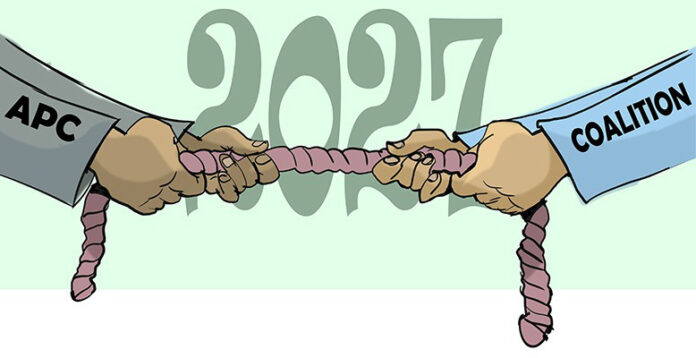Perhaps, we should repeat the oft-quoted cliché attributed to William Michael Daley, an American banker-turned-politician who became the 24th US White House Chief of Staff, that “In politics, there are no permanent friends, no permanent enemies, only permanent interests.”
Daley served as the White House Chief of Staff under President Barack Obama, from January 2011 to January 2012. Also, he was previously the 32nd U.S. Secretary of Commerce under President Bill Clinton.
Prior to all those White House appointments, Daley had a career in banking and finance, including serving on the executive committee of JPMorgan Chase & Co. In 2014, he tried, unsuccessfully though, to become Governor of Illinois and later, Mayor of Chicago in 2019.
William Michael Daley’s assertion has since become a common idiom in political discourse to denote “the pragmatic and often self-serving nature of political alliances and rivalries.”
In simple terms, “The idea is that political actors prioritize their own goals and objectives above personal relationships, leading to shifting allegiances and opportunistic partnerships.”
The above scenario best explains the current alignment and realignment in Nigeria’s political landscape tagged coalition among top shots of the Peoples Democratic Party, PDP, Labour Party, LP, and some defectors from the ruling All Progressives Congress, APC.
Aside from Atiku Abubakar and Peter Obi, former presidential candidates of PDP and LP respectively in the 2023 elections, notable figures backing the ADC coalition include Mr. Solomon Dalung, former Minister of Youth and Sports; David Bonaventure Alechenu Mark, former Senate President and former military governor of Niger State, now serving as Interim National Chairman of the ADC; Senator Gabriel Suswam, former Governor of Benue State and Yusuf Datti Baba-Ahmed, LP’s 2023 vice-presidential candidate and former senator for Kaduna North.
Other men of timber and caliber are Engineer Rauf Aregbesola, former Osun State governor and ex-Minister of Interior, now Interim National Secretary of ADC; Chief John Odigie Oyegun, first national chairman of APC and former Edo State governor; Prince Uche Secondus, former PDP National Chairman; Nasir El-Rufai, former Kaduna State governor; Emeka Ihedioha, former Imo State governor and deputy speaker of the House of Representatives and Senator Sam Egwu, former Ebonyi State governor, ex-Minister of Education, and current chairman of the Senate Committee on Industry.
The list is inexhaustive. It parades Chief Dele Momodu, a media mogul and PDP chieftain; Ireti Kingibe, LP Senator representing the Federal Capital Territory; Babangida Aliyu, two-term former Governor of Niger; Victor Umeh, former APGA National Chairman, now representing Anambra Central in the Senate on LP platform and Senator Dino Melaye, former PDP spokesperson during the 2023 presidential elections.
One cannot discountenance Senator Liyel Imoke, former Cross River State governor; Sule Lamido, former Governor of Jigawa State who has pledged support for the coalition while remaining within the PDP; Rotimi Amaechi, former Rivers State governor and Minister of Transportation; Aminu Waziri Tambuwal, former Sokoto State governor, ex-Speaker of the House of Representatives, and current senator and Abubakar Malami, former Attorney-General who resigned from APC to join ADC, strengthening the coalition’s legal and political arsenal.
Without doubt, the ADC is a strong coalition, similar in every material particular to the amalgamation of Action Congress of Nigeria, ACN, Congress for Political Change, CPC and other opposition parties into the APC in 2013 and won the presidential election two years later in 2015.
Against this backdrop, it is disturbing for the APC, the current power holders at the centre to describe the ADC coalition as that of disgruntled politicians bent on winning the 2027 presidential election at all cost.
And we ask: When Muhammadu Buhari and Asiwaju Bola Tinubu formed the APC coalition, were they tagged disgruntled elements even when it was obvious?
Did a serial loser that Buhari was not threaten that if he was not allowed to win the 2015 presidential contest, blood would flow and the country ungovernable by the humane incumbent President Goodluck Ebele Jonathan?
What constitutes disgruntlement more than this?
As the nation trudges on to the 2027 election year, we call on the incumbent government to tread cautiously. It must not attempt to muzzle the opposition coalition platform in whatever guise.
Instructively, some leaders of the coalition have said in the past that elections are not a do or die affair, even as the most disgruntled APC leader, Buhari, had his eight years unhindered.
Rather, the current federal power holders should concentrate on how to tackle Nigeria’s myriad of problems, especially the excruciating hunger and debilitating insecurity across the states instead of labelling opponents as disgruntled politicians.
They are not disgruntled but tested politicians who genuinely seek to effect change constitutionally.
“As the nation trudges on to the 2027 election year, we call on the incumbent government to tread cautiously. It must not attempt to muzzle the opposition coalition platform in whatever guise.”

